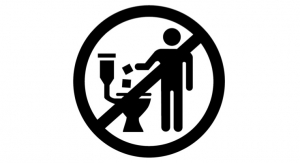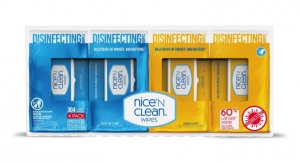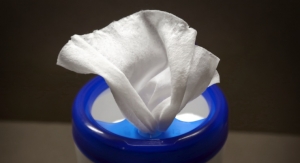Karen McIntyre, Editor04.12.18
The wipes industry scored a victory in December when a federal court put a hold on a Washington, D.C., city law regulating flushable wipe labeling. The legislation had passed the city council a year earlier and was due to go into effect on January 1—until the judge intervened on the basis the law violated plaintiff Kimberly-Clark’s First Amendment rights of freedom of speech.
The law defines a flushable wipe as one that disperses in a short period of time after flushing, is not buoyant, and does not contain plastic or any other material that does not readily degrade. It prevents manufacturers from labeling their product as “flushable” unless it meets those requirements, and it requires manufacturers of nonflushable wipes to communicate that “clearly and conspicuously.”
By forcing K-C, and other makers of flushable wipes, to not be honest about what their product can or cannot do, the district court judge said it violates the companies’ freedom of speech, especially considering the district does not consider alternative, less restrictive statutory language.
Industry efforts to protect flushable wipes from false claims that they are responsible for millions of dollars in sewage problems around the world have been well covered in the pages of this magazine. Analyses of sewage clogs in major cities around the world have shown that flushable wipes (as defined by standards created by INDA and its members in the wipes arena) bare little to no responsibility for the problems. In fact, an analysis of the New York City sewage system revealed that flushable wipes accounted for less than 2% of clogs, far less than other materials like paper towels and cooking grease, and this finding has influenced the city council to back down on a measure similar to the one passed in D.C.
As the fight continues, wipes industry insiders consider the D.C. ruling a win for flushability. Industry watchdogs expect that government agencies in other cities will tread more cautiously when considering similar bans and their accompanying language. Let’s hope there will be more victories for flushable wipes in the future.
Karen McIntyre
Editor
kmcintyre@rodmanmedia.com
The law defines a flushable wipe as one that disperses in a short period of time after flushing, is not buoyant, and does not contain plastic or any other material that does not readily degrade. It prevents manufacturers from labeling their product as “flushable” unless it meets those requirements, and it requires manufacturers of nonflushable wipes to communicate that “clearly and conspicuously.”
By forcing K-C, and other makers of flushable wipes, to not be honest about what their product can or cannot do, the district court judge said it violates the companies’ freedom of speech, especially considering the district does not consider alternative, less restrictive statutory language.
Industry efforts to protect flushable wipes from false claims that they are responsible for millions of dollars in sewage problems around the world have been well covered in the pages of this magazine. Analyses of sewage clogs in major cities around the world have shown that flushable wipes (as defined by standards created by INDA and its members in the wipes arena) bare little to no responsibility for the problems. In fact, an analysis of the New York City sewage system revealed that flushable wipes accounted for less than 2% of clogs, far less than other materials like paper towels and cooking grease, and this finding has influenced the city council to back down on a measure similar to the one passed in D.C.
As the fight continues, wipes industry insiders consider the D.C. ruling a win for flushability. Industry watchdogs expect that government agencies in other cities will tread more cautiously when considering similar bans and their accompanying language. Let’s hope there will be more victories for flushable wipes in the future.
Karen McIntyre
Editor
kmcintyre@rodmanmedia.com











